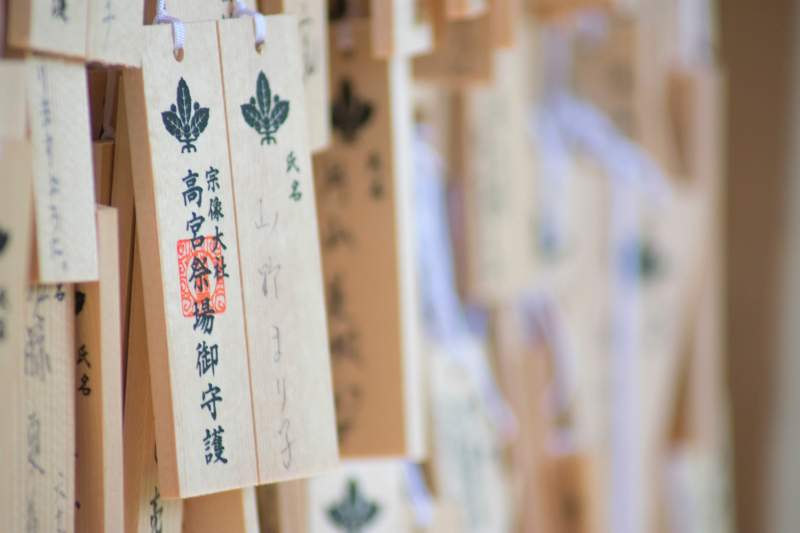
This is a collection of good old-fashioned hacks, where you'll discover how to learn Japanese fast.
They range from the down-to-earth, to the insane!
I started this post with over 100 entries, but I've whittled them down to only 42. I've aimed for variety and a bit of provocation.
My favourite tip is at the end, but be warned – it's only for the brave!
By the way, if you want to learn Japanese fast and have fun while doing it, my top recommendation is Japanese Uncovered which teaches you through StoryLearning®.
With Japanese Uncovered you’ll use my unique StoryLearning® method to learn Japanese naturally through story… not rules. It’s as fun as it is effective.
If you’re ready to get started, click here for a 7-day FREE trial.
Best Ways To Learn Japanese

1. Listen To 10,000 Hours Of Japanese Over The Next 18 Months
Just keep listening until you understand! How is this possible? Khatzumoto explains himself: “One of the more apparently “controversial” pieces of advice I've offered is to simply immerse in audio keep listening whether or not you understand the target language. It'll all just start to make sense. No doubt I am not the first person to have suggested this. At best I simply pushed the idea to its logical extreme…”
2. Get Your Daily News Fix From A Japanese Source
NHK News Web Easy is the kind of site that the internet was made for. Up-to-date news made easier for Japanese learners, with audio recording and accompanying text (complete with furigana, definitions and some word filtering tools). Once you've mastered the easy version, you can click on the link to view the original full-length news report in black-belt level Japanese. Amazing stuff!
3. Don't Go To School
John Fotheringham from Language Mastery got in touch with this interesting take on Japanese learning and motivation:
“Today's Japanese learner has unprecedented access to high quality teachers and resources, but it is critical to understand that no book, course, or teacher can ever get the language into your head for you. This is not The Matrix, Neo. Languages are acquired, not taught, meaning that fluency rests not on how many hours your butt has been in a classroom, but by how much meaningful exposure and practice you've had. Fortunately, the Internet allows you to find interesting listening and reading input and opportunities to practice speaking and writing output no matter where in the world you live or how little money you have. The limiting factor is no longer access, but motivation.”
John's written a guide on how to learn Japanese that is essential reading for anyone learning the language – click here to check it out.
4. Avoid Kanji
Benny Lewis from fluentin3months.com sent me this contribution:
“Controversial as this may be, and as much as others will definitely disagree with me, I highly recommend avoiding learning Kanji for the initial months (not always) if your goals in the language are more spoken based. If you are more focused on reading, ignore this tip, but working through just Kana (and Romaji) means that I have almost the same amount of work I'd have to learn a non-related European language to get to the same spoken level.”
5. Speak Japanese Every Day
He adds: “Also, speak with a real native every single day! Private tutors who live in Japan on iTalki are only $5/hour – and you thought everything in Japan was expensive!”
6. Enjoy The Japanese Learning Process
The secret is to use things or do things that you already like. Khatzumoto gives more detail:
“If you lack certain strengths or have a lot of weaknesses, then exploit your weaknesses for the purpose of learning Japanese. If you like playing video games, watching movies or even playing sports, simply make sure you do all those things in Japanese and/or with Japanese people (I played with a soccer team made up entirely of Japanese students plus me; too bad I don't like soccer). You could go running and play Japanese music while you do it…there's enough stuff out there for all your tastes.”

7. Relax In Japanese
Once you've finished the last season of Breaking Bad, start getting your daily TV fix with Japanese dramas. If you've been studying with text books, this approach will give you some valuable exposure to less formal, everyday language. Gooddrama.net is your one-stop-shop.
8. Avoid Japanese Burn-Out
Japanese can fry your brain. Judith Meyer got in touch to offer some ideas for what to do when that happens:
“If you're having an off day or if your brain is already tired of studying, see if you might be able to watch Japanese videos, for example your favourite anime. This is a way to keep Japanese active in your brain without the strain of studying a textbook or doing Anki. Some recommended video resources: For absolute beginners: Let's Learn Japanese. For upper beginners: Erin's Challenge. For everyone: Understand Your Favourite TV Series in 30 days.
Judith's put down 71 other ideas for learning Japanese in a an e-book.
9. Free Japanese Q&A
Get your Japanese questions answered for free at stackexchange.com.
EXTRA: Learn these 28 insane Japanese conversation starters to start talking with anyone!
Learn Japanese Culture

[Useful post: Japanese Culture for Foreigners: 19 Insider Secrets You Need To Know]
10. Don't Blame The Japanese For Speaking To You In English!
“Whether it be your significant other who won't speak to you in Japanese, or the cashier at the store who insists on practicing his 6th grade-level English despite the obvious fact that your Japanese is waaaaaaaaay better, never forget that you — and only you — are in charge of your language learning. If you need to enroll in Japanese classes or private lessons to get the practice necessary, then do so. If you need to immerse yourself in a Japanese-only environment, then go for it. But blaming others for not speaking Japanese with you is unfair,” says Amy Chavez.
11. Don't Worry About Being Formal Or Polite In Japan
William Peregoy wrote this piece of advice: “The Japanese don't like speaking formally…Drop the textbook formality, drop the complexity of polite forms, focus on the dictionary forms of the verbs first, speak casually, and make friends. That way, you can start having fun in the language quicker, and not worry so much about being formal and polite.”
12. Be Formal And Polite In Japan
André Pinto wrote to me from Japan with a different point of view: “Learn the -masu and polite forms before the casual ones otherwise you may end up like some people in here who speak to the university teachers like they do with their friends.”
[Which of these two views do you agree with? I have a very clear opinion on this…!]

13. Don't Learn Japanese From (Some) Anime
James explains: “A lot of Japanese learners get quite shockingly embarrassed when they find out that the line they just repeated from Dragonball Z in the middle of the civilised dinner is the equivalent of shouting out “you motherf*****”. Some popular anime (popular in America at least, and mostly reserved for little boys in Japan) uses the kind of language which is in the real world almost exclusively reserved for Yakuza. Using that in polite company will make you look like a big foreign jerk.”
14. There's A Lot More To Learning Japanese Songs Than Just The Words
As a way into a Japanese community, focus on learning songs that are relevant to your age group. “Karaoke is basically the unofficial national sport, says Jessica Aves. Japanese people love when foreigners can belt out their songs (the older it is, the louder they'll react) so get your practice in early. Karaoke groups are also a great way to make friends.” She tells you exactly which bands to listen to!
[Note: Get your Japanese song lyrics from utamap.com]
15. Join Activities Organised By A Japanese Association
Whenever people ask me how to learn Japanese, I always recommend doing this as early as possible.
A great idea from learn-japanese-adventure.com. They say: “The association normally holds many activities to help the locals to learn to speak Japanese. These activities include dialogue sessions with native Japanese, speech contests, Japanese language courses and other cultural activities, aiming to foster the relationship with the local people, as well as helping the locals to appreciate the beauty of the language.” A quick Google search revealed well over 7 such groups in New York, for example.
How To Learn Japanese Words

[Useful post: How to write in Japanese – A beginner's guide]
16. Find Out How To Use Japanese Words Naturally
Tatoeba has an extensive resource of sample sentences.
17. Exploit Romaji Before Going On To Learn Kana
Benny Lewis describes his dilemma in the early stages of learning Japanese: “I would recommend you learn lots of words and phrases first in Romaji, and when you have just enough to introduce yourself and ask the person to repeat themselves and keep some kind of basic flow, then transition to Kana only mode.”
18. Start Reading Japanese With Graded Readers
These are short stories written entirely in Japanese. Find out more from Wired in Japan.

19. Use Google Image Search To Check The Meaning Of Japanese Words
Tofugu.com explains this neat trick: “If you don't know what a Japanese word means, or if you just aren't sure about the translation you're getting, put it into Google Image search and see what pops up. Searching for images in Japanese will also tell you a lot about the Japanese society as a whole. The results will be different from your language's search because that culture will be reflected.” Nice!
20. Don't Learn The Japanese Writing System Without Some Supervision
Why not? The Matador Network says: “Although it's pretty easy to teach yourself the finite syllabaries of hiragana and katakana, the essential stroke order is often casually discarded by language learning newbies. In English, writing your letters oddly is just a character quirk; in Japan it will be assumed that you couldn't be bothered to learn it correctly. This assumption of laziness can also be attributed to you if you don't learn to hold your chopsticks properly. There is a difference between finishing a pen stroke with a sudden stop or with a swoosh. Stroke order is an essential of learning the basics of kanji, so don't skip it!”
Note from Olly: Kickstart your Japanese by learning hiragana in just a few hours. Click here to find out how.
Best Study Techniques For Japanese
21. Don't Use SRS To Learn Kanji!
Instead, bombard yourself with as much reading material as possible. Tae Kim says: “I personally recommend the “deluge” method of dumping your brain with TONS of interesting content. This means ploughing through pages of books and manga, hours of dialogue, and conversation practice forgetting more words than remembering them. Don't sit around wasting time entering and reviewing what you've already seen, just get more, more, and MORE STUFF!!! You'll be surprised at how much just seems to stick somehow like osmosis. Some people feel this is not effective because they end up forgetting so much stuff. They don't realise that the fact that they even remember forgetting it means they're learning it.”
22. Use Full Sentences In Your Japanese Flashcards
Japanese Lingualift says: “The first pillar of intensive language learning is an SRS system such as Anki or Kleio and a good deck of sentences. Learning from sentences instead of individual words or characters will let you learn more efficiently, force you to learn in balanced manner, and motivate you as the additional context often makes the process more interesting and many of the sentences are readily usable. What's good about sentences is that you not only learn new words and Kanji, but also understand how to use them in context, and what their nuance is depending on how they are used.”
He goes on to say: “As you have no time to waste, it's probably best to use a precompiled sentence deck shared by other users.”
Interesting – do you agree?
23. Use Cloze Sentences On Your SRS Japanese Flashcards
Instead of having single words on your flashcards, or even complete sentences, challenge yourself by having the target language as a blank in the middle of a sentence. Khatzumoto gives this example.
He goes on to talk about monolingual or bilingual flashcards: “Bilingual [flashcards] are good for when you lack the knowledge — or the context — to happily handle monolingual cards. Beginners, noobs and nervous nellies should focus just on bilingual cards. Just as with old skool sentence cards, don't go writing your own translations. If you're noob enough to need a translation, ya shouldn't be rolling your own.”
24. Get The Japanese App For iPhone
“Every time you hear a word you don't know, you look up it in the dictionary and then put it in the memory. Now when you have 10 minutes spare on the train or whatever, you simply call up the words and test yourself…this is great in itself for learning both vocab and kanji,” explains Richard from genkienglish.net.

25. Write In Japanese And Have It Corrected By A Native Speaker
Guidetojapanese.org says: “In the past, it's been fairly difficult to find Japanese speakers to correct your writing. Fortunately, there is now a social networking site built exclusively for this purpose with an excellent community: Lang-8.”
26. Learn “Sound Effects” In Japanese
Why? “Unlike in English, where sound effects are only found in comic books and cartoons, Japanese sound effects are part of daily speech and your speech sounds more natural if you learn them. Peko peko is how the Japanese describe a stomach growling, and adding desu (is/am) on the end turns the phrase into “I'm hungry.” Did you know that there are at least four ways of describing the sound of rain in Japanese? They even have a sound to describe silence,” explains Jessica Aves.
27. Improve your reading speed with songs
The Matador Network says this: “Following lyrics will help you recognize kana and kanji, increase your reading speeds and, of course, teach you how Japanese should really sound. This is also important because in Japan.
Olly's tip:
Learn Japanese Grammar
Take your pick from four different perspectives on approaching Japanese grammar!
28. Think In Patterns
We can look at Japanese grammar in a different way to other languages, according to Steve Kaufmann, who sent me this fascinating perspective on the language: “Some languages have lots of details, case or verb endings, and rules. Unlike these languages, Japanese has patterns that we just need to get used to. This takes time and a lot of listening and reading.”
And there's no better place to do this than at LingQ.
29. Learn Japanese Grammar From The Start
Don't ignore Japanese grammar – it's worth studying from the start, says this article at tofugu.com. “Trust me, studying the grammar now will help you learn faster in the long run, since you don't have to always stop and wonder why this particle was used here instead of that one, or what the heck is this verb form I've never seen it before.”

30. Learn Japanese Grammar Bit by bit
Alternatively, take a step-by-step approach to grammar rules. Jorge Manoel explains: “When learning Japanese, the best thing to do is to learn grammar patterns little by little. Having a knowledge of them, making phrases will become easier.”
31. Understand It, Then Move On
Jan van der Aa took time out of his +1challenge to write: “Japanese is a not an easy language, with complex grammar. Don't focus too much on the grammar rules in the beginning, just make sure you understand the structure, learn words, and try to make simple sentences by yourself”
Tools And Resources For Japanese Learners

32. Set Up Japanese On Windows
Follow these simple steps from Japanese Lingualift
33. Set Up Japanese On Your Mac
Christopher Bolton explains how.
34. Install Rikaichan
…on Google Chrome to instantly look up Kanji just by hovering the mouse over it. Get it here. The Firefox version can be found here. Try it now with this Kanji: ??
35. Learn How To Look Up Kanji That You've Never Seen Before
From guidetojapanese.org: “If you're trying to find a word with Kanji you've never seen before, you need to find each one and stitch the word together using copy+paste. The multi-radical Kanji search is one of the easiest ways to find Kanji. You may also want to try http://jisho.org/kanji/radicals/. It has a nicer interface and offers real-time search results.”
36. Invest In Some Quality Japanese Learning Material
“Invest in a solid dictionary that has Kanji, the Hiragana for each Kanji and an English definition. Also, pick up Barron's Japanese Grammar book immediately. Wait on purchasing a Kanji dictionary or cards until later in your studies,” says Jessica Aves
37. Use A Good Online Japanese Dictionary
But which one? “Weblio is the best dictionary I've ever seen, with English-Japanese and Japanese-English translations,” says Jorge Manoel.
38. Use Memrise To Learn To Read The Kanawriting System
“I dove straight into learning Kana [and] I found the system on Memrise to present it very well,” explains Benny Lewis.
39. Find An Online Japanese Tutor
“If you are learning Japanese outside of Japan, finding an online tutor or a language partner that you enjoy learning and speaking Japanese with makes a huge difference and can also be a lot more fun,” says Brian Kwong. “You can also find a free language partner with this step by step video, or if you want to save time, you can get quality and affordable tutor from iTalki.com.”

40. Take Time To Find The Japanese Tutor That's Right For You
Benny describes his recent experience looking for a tutor on iTalki.com:
“Another thing I've been doing this week is alternating between different teachers on iTalki to decide who I would learn the most with. Sometimes they use way too much English, despite me insisting on Japanese, and if they keep it up then I don't request future sessions. One or two teachers showed good initiative and themselves were insisting on Japanese only before I could mention that I'd prefer this, so I'll be sticking with them, even though (and precisely because) those are the sessions that absolutely exhaust me the most.”
Benny's got very specific criteria for choosing a tutor. What would be yours?
41. Learn Key Japanese Phrases
Learn phrases to keep the conversation in Japanese during a language exchange. You could do a lot worse than this list, courtesy of guidetojapanese.org.
Alternatively, check out my guide to the 73 basic Japanese phrases you'll need to survive your first conversation with a native speaker. And if you're still looking for a native speaker to talk to, discover how to find a language partner in Japan.
42. Ready For Some Serious Japanese Speaking Practice?
Lindie Botes is a brave woman:
“My tips are quite odd and daring but they work for me. I use a phone application called Saito San (also known as “Mr and Mrs Smith”) to literally phone random people. It connects you via a phone call to someone in Japan. Through this I force myself to practice conversational Japanese and put myself in a situation where I can't use English. After all, immersion and speaking the language is how a child learns to speak, right?”
See a video of her trying out this app here.
42 Hacks To Learn Japanese Fast

I hope you found some inspiration amongst these tips. But remember, that's all they are – tips. Whilst they can help you in your search for fresh ideas from day to day, keeping going for the length of time it takes to learn Japanese requires you to keep your eye on the bigger picture.
In that spirit, I'll leave you with these little gems from Khatzumoto (@ajatt):
- It is more important to know more Japanese at lunchtime than you did at breakfast…than it is to have a good plan.
- Somewhere between “give up completely” and “do it all 100% perfectly” is the level where things actually get done.
- Don't read a book once carefully. Read it 10 times, 100 times, sloppily.
- Don't try to improve your technique. Improve your practice (volume, depth, frequency). Your technique will improve on its own.
- Do NOT get it right the first time, or even the first 9999 times. Get it GOING the first time. Get it right later.
BONUS HACK: #43 Learn Japanese Through Story

If you'd like to speed up your Japanese learning journey, without spending all your time pouring over grammar books, then I've got something for you.
It's Japanese Uncovered, my story-based course, that will help you go from Japanese beginner or false beginner to intermediate while immersing yourself in a compelling story.
Instead of learning grammar rules and ending up translating in your head when you speak, your learning takes place as you read and listen to the story.
It's the same process I used to learn Italian in 3 months from home, by just listening to and reading compelling content. I've distilled that method into a comprehensive course where I help you discover Japanese through story.
If you’re ready to get started, click here for a 7-day FREE trial.

Olly Richards
Creator of the StoryLearning® Method
Olly Richards is a renowned polyglot and language learning expert with over 15 years of experience teaching millions through his innovative StoryLearning® method. He is the creator of StoryLearning, one of the world's largest language learning blogs with 500,000+ monthly readers.
Olly has authored 30+ language learning books and courses, including the bestselling "Short Stories" series published by Teach Yourself.
When not developing new teaching methods, Richards practices what he preaches—he speaks 8 languages fluently and continues learning new ones through his own methodology.









































